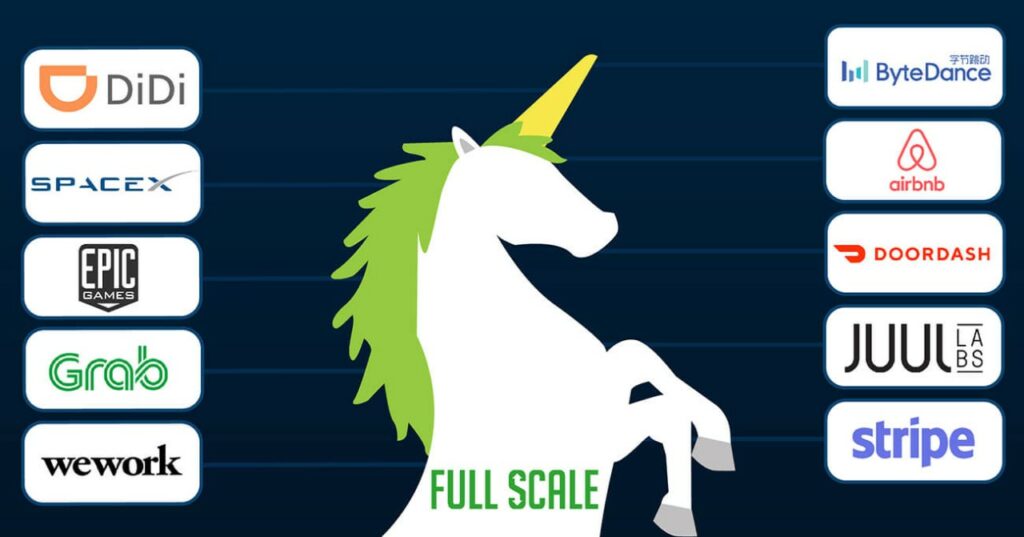The landscape of startups has undergone a remarkable evolution in recent years. This is marked by the emergence of what are known as unicorn companies. These unicorns, not of the mythical variety but of the business world, have captivated the imagination of investors and entrepreneurs alike with their astronomical valuations and rapid growth trajectories.
Yet beneath the glittering facade lies a story of shifting tides and changing expectations. In this article, we’ll explore the rise and fall of unicorn startups, delving into the factors that have propelled them to prominence and the challenges that now threaten their reign.
From the allure of venture capital to the sobering realities of market dynamics and regulatory pressures, we’ll dissect the waning age of unicorns and its implications for the broader startup ecosystem. Join us on a journey through the highs and lows of unicorn culture as we navigate the uncertain terrain of modern entrepreneurship.
Table of Contents
What Are Unicorns?
In the realm of startups, a unicorn is not a mythical creature with a single horn but rather a rare breed of company that achieves a valuation of $1 billion or more while still being privately held.
These unicorns are the darlings of the startup world, capturing attention with their rapid growth, disruptive innovation, and potential for massive returns on investment. But what sets these companies apart from the rest of the startup pack?
Characteristics of Unicorns
Unicorn startups possess several key characteristics that distinguish them from their peers. Firstly, they exhibit exponential growth, often scaling their operations and user base at an unprecedented rate. This rapid growth is fueled by disruptive innovation, as unicorns introduce new products or services that revolutionize industries and capture market share from established incumbents. Additionally, unicorns typically attract substantial investment from venture capital firms, providing them with the financial resources needed to sustain their growth trajectory.
Criteria for Unicorn Status
To be classified as a unicorn, a startup must meet specific criteria regarding its valuation and ownership structure. Traditionally, a company achieves unicorn status when it reaches a valuation of $1 billion or more in a fundraising round, typically through the sale of preferred stock to investors.
This valuation is based on the perceived future potential of the company rather than its current revenue or profitability. Furthermore, unicorns are typically privately held, meaning their shares are not traded on public stock exchanges, and ownership is limited to a select group of investors and employees.
Historical Context
The term unicorn was first popularized in the venture capital community by venture capitalist Aileen Lee in 2013. At the time, such companies were rare and considered extraordinary due to their elusive nature and remarkable valuations. However, as the startup ecosystem evolved and venture capital funding became more abundant, the number of unicorns began to proliferate. Today, unicorns are no longer as rare as they once were, with hundreds of companies worldwide achieving unicorn status.
Significance of Unicorns
Unicorn startups play a significant role in driving innovation, economic growth, and job creation. They often serve as catalysts for industry disruption, challenging established players and pushing boundaries in technology, finance, healthcare, and other sectors.
These miracle startups attract top talent, capital, and resources, creating a virtuous cycle of innovation and investment within the startup ecosystem. Moreover, the success of unicorns can inspire aspiring entrepreneurs and investors, fueling further innovation and entrepreneurship.
Unicorns represent the pinnacle of achievement in the startup world, embodying the aspirations of entrepreneurs and investors to disrupt industries, create value, and achieve extraordinary returns. While their rarity may have diminished in recent years, the allure and impact of unicorns continue to shape the trajectory of the startup ecosystem and the broader economy.
The Rise of Unicorns
The ascent of unicorn startups has been a phenomenon of the modern business landscape, reshaping industries and capturing the imagination of investors worldwide. Understanding the factors behind their rise is crucial to appreciating their significance and impact on the startup ecosystem.
Several key factors have contributed to the meteoric rise of unicorn startups:
Venture Capital Influx
Unicorn startups have benefited from a surge in venture capital funding. Low interest rates, favorable economic conditions, and an appetite for high-risk, high-reward investments have fueled this surge.
Venture capitalists, drawn by the potential for outsized returns, have poured billions of dollars into promising startups, providing them with the financial resources needed to scale their operations and pursue aggressive growth strategies.
Technological Innovation and Disruption
Unicorns often leverage cutting-edge technology to disrupt traditional industries and create entirely new markets. Whether it’s artificial intelligence, blockchain, or biotechnology, unicorns harness the power of innovation to solve complex problems, improve efficiency, and drive value for customers.
Unicorns position themselves as leaders in their respective fields, attracting attention and investment from both customers and investors. They do this by staying at the forefront of technological advancements
Changing Consumer Behaviors and Market Trends
Unicorn startups are adept at identifying and capitalizing on emerging consumer trends and market opportunities. From the rise of the sharing economy to the growing demand for sustainable products and services, unicorns have a knack for anticipating and responding to shifting consumer preferences.
By staying agile and responsive to market dynamics, unicorns can quickly adapt their business models and strategies to capitalize on new opportunities, gaining a competitive edge in crowded marketplaces.
Successful Unicorn Startups
Numerous unicorn startups have achieved remarkable success across various industries, including technology, finance, e-commerce, and healthcare. Some notable examples include:
- Uber: Revolutionizing the transportation industry with its ride-hailing platform, Uber became one of the most valuable startups in history, reaching a valuation of over $80 billion.
- Airbnb: Disrupting the hospitality industry by allowing homeowners to rent out their properties to travelers, Airbnb achieved unicorn status and transformed the way people travel and experience new destinations.
- SpaceX: Pioneering the private space exploration industry, SpaceX has revolutionized space travel with its reusable rockets and ambitious plans to colonize Mars, earning it a valuation of over $100 billion.
These success stories highlight the transformative impact that unicorn startups can have on society, the economy, and culture, inspiring innovation and entrepreneurship on a global scale.
By harnessing the power of technology, innovation, and market disruption, unicorns have redefined industry norms. They’ve challenged traditional business models and created unprecedented value for investors, customers, and society at large. As the startup ecosystem continues to evolve, the legacy of unicorns will endure as a symbol of entrepreneurial ambition, resilience, and ingenuity.

The Waning Age of Unicorns
While unicorn startups have enjoyed unprecedented success and acclaim in recent years, their reign at the top of the startup hierarchy is facing increasing challenges and uncertainties. The waning age of unicorns is characterized by a combination of factors that are reshaping the landscape of startup valuations, investment strategies, and market dynamics.
Increasing Scrutiny and Skepticism
Unicorn startups are facing growing scrutiny and skepticism from investors, industry analysts, and the public alike. Questions surrounding the sustainability of their business models, the validity of their valuations, and their path to profitability have come to the forefront as investors seek to differentiate between hype and substance.
The once-uncritical optimism surrounding unicorn startups has given way to a more sober assessment of their long-term prospects, leading to increased caution and risk aversion among investors.
Failed Unicorns
The downfall of high-profile unicorn startups has served as a cautionary tale for the broader startup ecosystem, highlighting the pitfalls of unchecked growth and unsustainable business practices. Notable examples such as WeWork, Theranos, and others have tarnished the reputation of unicorns and cast doubt on the viability of their business models.
These failed unicorn case studies have underscored the importance of sound fundamentals, transparency, and accountability in building successful and sustainable businesses, prompting investors to reevaluate their investment criteria and risk assessment processes.
Market Dynamics and Regulatory Challenges
Unicorn startups are facing increasingly challenging market dynamics and regulatory hurdles that threaten their growth prospects and profitability. Market saturation, intense competition, and shifting consumer preferences have made it harder for unicorns to maintain their market dominance and sustain their growth rates.
Regulatory scrutiny and compliance requirements pose significant challenges for unicorns operating in highly regulated industries such as finance, healthcare, and transportation. Increased regulatory oversight and enforcement actions have forced unicorns to reassess their strategies and adapt to evolving regulatory landscapes, adding complexity and uncertainty to their business operations.
Shifting Investor Priorities
Investor priorities are shifting from growth at all costs to profitability and sustainability, signaling a broader shift in the investment landscape. The era of easy money and exuberant valuations is giving way to a more disciplined and rational approach to investment. Investors now place greater emphasis on fundamental metrics such as revenue growth, profit margins, and cash flow generation.
Unicorns that fail to demonstrate a clear path to profitability or sustainable growth are finding it increasingly difficult to attract investment capital. This has forced investors to reassess their strategies and pivot towards more sustainable business models.
Evolving Startup Culture and Mindset
The waning age of unicorns is reshaping the culture and mindset of the startup ecosystem. It’s fostering a greater focus on resilience, adaptability, and sustainability. Entrepreneurs are reevaluating their growth strategies and business models in light of changing market dynamics and investor expectations. They’re prioritizing profitability and long-term viability over rapid expansion and market share acquisition.
The rise of alternative funding and investment models such as bootstrapping, revenue-based financing, and crowdfunding is providing entrepreneurs with new avenues for capital formation and growth, empowering them to build successful and sustainable businesses outside the traditional unicorn mold.
The waning age of unicorns represents a paradigm shift in the startup ecosystem, characterized by increasing scrutiny, skepticism, and regulatory challenges. Unicorn startups have reshaped industries, created value, and inspired innovation. But their dominance is being challenged by changing market dynamics, investor priorities, and regulatory environments.
As the startup ecosystem continues to evolve, the legacy of unicorns will endure as a symbol of entrepreneurial ambition and ingenuity. However, their reign at the top of the startup hierarchy is facing increasing headwinds and uncertainties.
Implications for the Startup Ecosystem
The waning age of unicorns has far-reaching implications for the broader startup ecosystem. It reshapes entrepreneurial aspirations, investment strategies, and industry dynamics. As the era of unchecked growth and exuberant valuations gives way to a more disciplined and rational approach to startup growth, several key implications emerge:
Evolving Startup Culture
A shift in the culture and mindset of the startup ecosystem is coming. Entrepreneurs are reevaluating their growth strategies and business models. There is a growing recognition that sustainable growth and profitability are essential for long-term success. This is prompting entrepreneurs to prioritize sound fundamentals and resilience over rapid expansion and market dominance.
This shift in mindset is creating opportunities for alternative funding and investment models such as bootstrapping, revenue-based financing, and crowdfunding. They empower entrepreneurs to build successful and sustainable businesses outside the traditional unicorn mold.
Opportunities for Alternative Funding
The waning age of unicorns is opening up opportunities for alternative funding and investment models. These prioritize profitability and sustainability over rapid growth and market share acquisition. Self-funding allows entrepreneurs to retain full control over their businesses. Build them at their own pace without the pressure to scale quickly or achieve unicorn status.
Revenue-based financing provides startups with access to capital based on their existing revenue streams. This allows them to grow organically without taking on excessive debt or diluting equity.
Crowdfunding platforms offer entrepreneurs a way to raise capital from a large pool of individual investors. They democratize access to funding, reducing reliance on traditional venture capital.
Focus on Solving Real-World Problems
Entrepreneurs are now focused on solving real-world problems and creating sustainable value for customers and society. They’re not chasing elusive unicorn status or pursuing flashy but unsustainable business models.
Entrepreneurs are increasingly prioritizing solutions that address tangible pain points and deliver meaningful benefits to users. This shift towards problem-solving entrepreneurship is fostering innovation across a wide range of industries. It also drives positive change in society.
Resilience and Adaptability
The decline of unicorns underscores the importance of resilience and adaptability in navigating the challenges of the startup journey. Startups that prioritize resilience, flexibility, and agility are better equipped to weather market downturns, regulatory changes, and competitive pressures.
They’re much more able to survive and thrive in an increasingly uncertain and volatile business environment. By embracing uncertainty and learning from failure, entrepreneurs can build resilient businesses. These are capable of adapting to changing market conditions and emerging opportunities.
Addressing Societal Challenges
There are a lot of pressing challenges facing society today. Whether it’s combating climate change, improving access to healthcare and education. It will also promote economic opportunity and social inclusion. So, startups have the potential to drive positive change and create lasting impact.
By harnessing the power of technology, innovation, and entrepreneurship, startups can develop scalable solutions. These address critical societal needs and contribute to a more sustainable and equitable future for all.
Unicorns Under Scrutiny
The waning age of unicorns marks a pivotal moment in the evolution of the startup ecosystem. The allure of rapid growth and exuberant valuations gives way to a more sober assessment of sustainability and resilience.
Entrepreneurs and investors alike are reevaluating their priorities and strategies. The decline of unicorns may signal the end of an era. It also represents an opportunity for innovation, creativity, and positive change.
Embracing a more holistic approach to entrepreneurship and investment, builds a more diverse, resilient, and sustainable startup ecosystem. This drives meaningful impact and creates lasting value for society.
What do you think about the decline of unicorns? Talk to us in the comments below!
For more similar blogs, visit EvolveDash today!
FAQs
- How do unicorn startups make money if they are not profitable?
Many unicorns operate at a loss for years, relying on venture capital funding to sustain growth. They often focus on acquiring users, expanding market share, and building brand dominance before turning to profitability through monetization strategies like subscriptions, advertising, or premium services.
- Why do some unicorns fail despite having billions in funding?
Failure can result from unrealistic valuations, unsustainable business models, regulatory challenges, leadership issues, or market saturation. Some unicorns prioritize growth over financial health, leading to cash burn without clear paths to profitability.
- What industries produce the most unicorn startups?
Technology-driven sectors like fintech, artificial intelligence, e-commerce, health tech, and SaaS (Software as a Service) produce the most unicorns. These industries benefit from high scalability, digital adoption, and investor interest.
- What happens to employees when a unicorn startup fails?
Employees often lose jobs, and those with stock options may see their shares become worthless if the company shuts down or gets acquired at a lower valuation. In some cases, employees may find opportunities at competitors or emerging startups in the same industry.
- Are unicorns still relevant, or is the startup focus shifting?
Unicorns remain relevant, but investors and founders are shifting focus toward sustainable growth, profitability, and long-term stability rather than rapid expansion. Alternative funding models and capital-efficient startups are becoming more attractive in the evolving startup ecosystem.



















